Investiture of 174 PhDs at the University
The researchers came from 23 countries and conducted the doctorate in 13 countries. Schools
The celebration of doctorate at the University of Navarra had the special protagonism of the Pamplona García del Barrio family, as two of its members, brothers Guillermo and Pedro, received their doctoral caps at classroom Magna. They are part of the class of 174 graduates who have obtained the Degree doctorate in the last year at the University of Navarra. They belong to 13 Schools, come from 23 countries and have completed the training that qualifies them for their dedication to the research and the teaching university. The School of Sciences, with 31 people, is the one that has contributed the most doctors to this promotion, followed by Philosophy and Letters with 25 doctors, Pharmacy (24) and Medicine (20). They are followed by Theology (19), Engineering (13), Communication (10), Law (9), Ecclesiastics of Philosophy (8), Economics and Business (7), Canon Law (5), IESE (2) and Architecture (1).
Among the doctors are representatives from European countries (France, Italy, Poland and Portugal), North and South America (United States, Mexico, El Salvador, Venezuela, Bolivia, Colombia, Brazil, Paraguay, Uruguay, Argentina and Chile), Africa (Congo) and Asia (Philippines, New Zealand, Taiwan, China). In total, 45 new doctors come from other countries and 129 from Spain, including 33 from Navarra.
As is tradition at the University of Navarra, coinciding with the end of the academic year, the solemn act of investiture of the new doctors was held under the presidency of President, José Mª Bastero, accompanied by several vice-rectors, the University Secretary and the Dean of the School of Law. The sponsor of the graduating class, Professor Faustino Cordón, of the School Law School, reminded the new doctors that, because they have greater knowledge and culture, they have greater social duties and a mentality of service to others. "In this way you will develop the criterion that is gradually sedimented over the years and forms the serene maturity, that state of the personality in which the person becomes sample master of himself. It is a criterion in whose training will have intervened multiple elements, but that is becoming staff, integrating itself in oneself and that will take you to know how to value the things that are really worthwhile".
Loving freedom and serving othersAfter the imposition of the caps symbolizing the Degree of doctor, one of the participants, Guillermo García del Barrio, from the School of Pharmacy, gave thanks on behalf of his fellow graduates. "In this year in which we celebrate the centenary of the birth of the founder and first Chancellor and in which, in addition, we commemorate the fiftieth anniversary of the beginning of the University of Navarra, I would like to focus my thanks on the institution itself and the spirit that sustains it."
"I think that it was the magnanimous spirit of Josemaría Escrivá that made him capable of conceiving and carrying out a generous business like this one, open to all, without discrimination, in which one is taught to love the freedom of all, to live with all, to serve others, to serve society as a whole. What's more: its operative ardor infected all those who, 50 years ago now, were able to promote the birth of this institution.... And those beginnings, I imagine, had more difficulties than a doctoral thesis . That is why I would like to thank the generosity, optimism and tenacity of all the professors and employees who made this project possible in those years and all those who make it possible today, especially its current Chancellor, Bishop Javier Echevarría. My most sincere thanks. And, of course, my heartfelt congratulations on this 50th birthday to all of us who are part of the University of Navarra today.
The University of Navarra, 50 years laterThe President, who closed the ceremony, referred to the beginnings of the university: "In October 1952, a handful of professors and several dozen students, occupying borrowed premises, started the University of Navarra. Thus began a business which, like any true adventure, had a future that was both promising and uncertain at the same time. Almost half a century later, in the same year in which, by providential coincidence, its founder, Josemaría Escrivá de Balaguer, will be canonized, the University of Navarra is preparing to celebrate its fiftieth anniversary with a double certainty: business is fortunately consolidated, without ceasing to be, even today, an exciting adventure.
Following the recent events [attack of May 23] "there have been countless expressions of solidarity and affection that the University of Navarra has received from its alumni, parents of students, university colleagues, authorities, institutions and citizens. I thank all of them for their affectionate support. But I must confess that my greatest joy has been to see that the founding spirit is still alive in all those who make up the University of Navarra -students, professors and staff not professor-. With your most energetic repudiation, compatible with the forgiveness of the perpetrators, your generous work and exemplary behavior, you have managed to continue your daily activities with complete normality, which, in these situations, is the best possible response".
University and social challengesThe President added that "we can draw valuable lessons from our University's past. Of course, it is not a matter of nostalgically recalling past times, but of delving once again into our roots, to draw from them the sap with which to enliven our daily tasks and the projects that this academic corporation hosts. Because the high vision of those first ones and the audacity with which they developed are still necessary, as much -or even more- than fifty years ago".
Indeed, "the University of Navarra has yet to be built. Let this be understood well: we have a foundational spirit, undoubtedly our greatest asset, which gives the University a well-defined identity. And it is precisely fidelity to that spirit that demands a continuous revision of our activity professor and research to adapt it to the historical reality in which we are immersed, because only in this way can we offer an adequate service to the authentic needs of society, whose intellectual challenges must be our own, as our founder wanted. In this sense, the University of Navarra must become itself every day".
"From my perspective, I can assure you that the future of the University of Navarra is exciting and full of interest, because there are attractive challenges on the horizon. summary In the field of professor we must continue our efforts to offer a truly personalized teaching , so that students may be responsible for their human and professional training . In the field researcher, the results must reach, as far as possible, levels of international excellence, especially in those areas where questions with greater ethical repercussions are at stake, since we aspire that the University not only adapts to the new social circumstances, but that it is capable of placing itself - as our Chancellor, Bishop Javier Echevarría, has reminded us - at the very origin of the changes, to collaborate in making ours a more prosperous and supportive world, in final to configure a more human, more Christian society".
SCHOOL OF ARCHITECTURE
Ignacio J. De Jesús Palma Carazo
School OF SCIENCES
Gustavo Amores Olazaguirre
Roberto Arias de Manuel
Ricardo Aroca Álvarez
Ibon Azcona Villaverde
Miguel Ángel Barajas Vélez
Francisco Javier Beaumont Ezcurra
José Luis Bocos González
Inés Noelia Casares Lagar
Mario Díaz Fuentes
Mª Luisa Etayo Ferrer
Ana Isabel Fernández Calvo
Guillem Genove Martínez
Sixto Giménez Julia
Beatriz Huarte Irurzun
Nuria Jiménez Gil
Mª Esther Lasheras Adot
Francisco Javier Lopetegui Garnika
Ascensión López Díaz de Cerio
José Ignacio Martín Subero
Eduardo Mirpuri Merino
Mª Pilar Modrego Alcalde
Leticia Odriozola Moncayola
Mª Josefa Pajares Villandiego
Isabel Pérez Mato
Leticia San Emeterio Garciandía
Mª José Sánchez de Miguel
Mª Teresa Sesma Pascual
Elena Sotillo Piñeiro
Carolina Tapia de la source
Marta Mª Varela Rey
Miguel Ángel Zaratiegui Biurrun
School COMMUNICATIONS
Isabel Mª Azcárraga Alonso
Carlos Bassas del Rey
Mª Pilar Buil Gazol
Pablo Echart Orús
Marta Frago Pérez
Mª Iranzu García Iriarte
Jerome Kliatchko
María Lafuente Soler
María Luengo Cruz
José Luis Requejo Alemán
School OF LAW
Antonio Abruña Puyol
Marina Camps Merlo
Francisco Javier Fernández Orrico
Luis Gutiérrez Goñi
Pedro Julio Montano y Gómez de Alia
Manuel Mª Olábarri Santos
Cecilia Mª Rosende Villar
Javier Carlos Tros de Ylarduya Guerendiain
José Gilberto Valderrabano Amador
School DE Canon Law
Jorge Bosch degree program
Manuel de la Puente Brunke
Ignacio Font Boix
Alexandre de Carvalho Lugli
Andrzej Wojcik
ENGINEERING SCHOOL
Jaime Aguilera Pérez
Mikel Arcelus Alonso
Francisco Javier Atencia Fernández
Isabel Marina González Farias
Juan José Goñi Zabala
Javier Hernández de Miguel
Antonio Iriondo Saint-Gerons
Mª Teresa Linaza Saldaña
Juan Meléndez Lagunillla
Rafael Muñoz Beltrán
Armando Muñoz Emparan
Mª Nuria Rodríguez Martínez
Javier Santos García
School ECCLESIASTIC OF Philosophy
Fernando Domínguez Ruiz
Marlon A. Gacho
Edgardo Grimaldi Interiano
Francisco de Borja León González
Erlito A. Maraya
Eduardo Pelaez Lopez
Richard James Umbers
Jaime Andrés Williams de Toro
School ECONOMICS AND BUSINESS ADMINISTRATION
Marisol Basabe Aldecoa
Justo Paul Ivan Corcuera García
Pedro García del Barrio
Cernin Javier Martínez Yoldi
Javier Santiago Muñoz Labiano
José David Taguas Coejo
Maximilian Baron Torres
School FROM Philosophy AND LETTERS
Miguel Andrés Acosta López
José Tomás Alvarado Marambio
Mª Pilar Andueza Unanua
Ángel Manuel Arias Urrutia
José Luiz de Carvalho Cardoso
Marcellino Cuesta Alonso
José Benigno Freire Pérez
Mª del Pilar García Ruiz
Mª Concepción Hernández Escayola
Pablo Hispán Iglesias de Ussel
Roldán Jimeno Aranguren
Gisela López Luzardo
Víctor Martínez de Artola González
Juan Andrés Mercado Montes
Antonio Páramo de Santiago
Amaya Riesco Vidaguren
Mariano Ramón Rodríguez López
Alberto Rodríguez Rípodas
Horacio Sánchez Parodi
Sergio Carlos Sánchez-Migallón Granados
Eduardo Segura Fernández
Rosa Mª Tabernero conference room
Chien Yi Tu
Manuel Tudela López
Mª Idoya Zorroza Huarte
School OF PHARMACY
Beatriz Abad Bañuelos
Susana Agarraberes Sánchez
Pau Arbós Vila
Mª Soledad Corbalán Tutau
Mª Francisca Galindo Anaya
Guillermo García del Barrio
Raquel García Navarro
Elena García de Jalón Crespo
Ana Gloria Gil Royo
Nerea Goyeneche Herrero
Luis Gracia Valen
Isabel Hervías Aldama
Eider Larrarte Lázaro
Tatiana Macho Azcárate
Saida Melero Ibáñez
Cristina Montoya Irigoyen
Mª Isabel Murillo Martín
Mª de los Dolores Parra Astorgano
Mª del Camino Pérez Carrazoni
Javier Rapado Santaolalla
Elena Rebollar Torres
Mª Almudena Sánchez Villegas
Sonia Sanz Hernández
Raquel Urtasun Alonso
School OF MEDICINE
Manuel Alegre Esteban
Eduardo Álvarez Lozano
Conrado Augusto Arriagada Mora
Francisco Javier Aztarain Díez
Mª Teresa Betes Ibáñez
Francisco Javier Cervera Paz
Agustín Espi Rovayo
Tania Errasti Alcalá
Xing Fang
Mª Elena Fernández Jarne
José Ramón Gurpequi Resano
Mª del Pilar López García
José Ángel Lozano Orella
Mª Pilar Martínez Rubio
José Mª Pego Reigosa
Jesús Ciro Pueyo Villoslada
Raquel Ríos Fernández
Lilian Blanca Ruiz Oblitas
José Mª Silberberg Muiño
Pablo Soriano Gil-Albarellos
School OF THEOLOGY
Carlos Barba Avila
Máximo Barbero Pérez
Santiago Casas Rabasa
Miguel Ángel Castelló Gallego
Arturo Cattaneo
Apollinaire Cibaka Cikongo
Juan Costa Bou
Romulo Alexis Gonzalez Diaz Barreiro
Gerardo Güemes Sedano
José Luis Francisco López González
Rodrigo Lynce de Faria
Jean-Marie Vianney Mugangu Lwaboshi
Jaime Alberto Naranjo Giraldo
Román Rodríguez Sol
Piotr Rossa
Conceso Sobradillo Casado
Rene O. Tapel
Dindo Rei Monsale Tesoro
Fernando Vera Zorrilla
IESE
Carlos Portales
Martha Rivera


